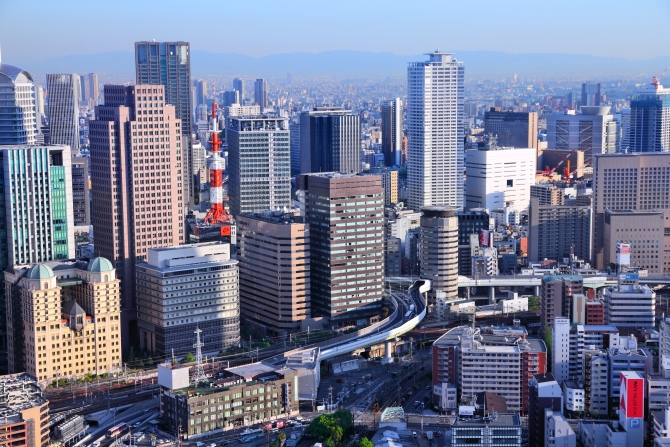Under Prime Minister Shinzo Abe, Japan has seen an economic rebound, but the benefits being referred to as “Abenomics” appear to be benefitting Tokyo and not the outlying areas.

For a time, as the Bank of Japan busily printed money and Abe spent it, commercial property investment did spill outside of the capital into the countries larger regional cities.
This barometer of economic activity indicated gains in the first six months of last year, with commercial land prices rising 1.9 per cent in Tokyo and 1.5 per cent in Osaka and Nagoya. It was the second year of price increases.
In the rest of Japan, prices fell by 2.2 per cent, making it a 23rd consecutive annual decline.
Rents for prime office space in Tokyo rose in November from the previous month. In Osaka rates were flat. In other major cities, rents fell, according to data provided by broker and research firm Miki Shoji Co.
A case in point is a large city block located in central Osaka, the second most expensive city in Japan. With the exception of temporary office structures, it has remained undeveloped since 2012, when Japan Post Co. demolished the Osaka Central Post Office. At that time, it intended to build a 40-story office and retail tower complex.

Japan Post has put the project on hold while it “onsiders the economic environment and development plans in the district.
Giant Front Osaka office and retail development is located close to Japan Post’s temporary offices. The complex, which opened in 2013, has a vacancy rate of 30 per cent.
The vacancy rate for prime commercial real estate in Osaka dropped to 8 per cent in November from 9.85 per cent. This figure is still higher than the 5-6 per cent figure that is considered healthy. The city’s average annual rent has dropped 1.5 per cent over the past 12 months.
The problem is that when a new tower is built in Osaka, tenants move in from the same area. No new commercial tenants are coming from outside the city to rent the available space.
In Nagoya, the country’s third-largest regional economy, the commercial property market jumped in anticipation of a new super-high-speed train service, even though it will not be operational for over a decade.
The number of transactions in that city increased eight per cent in the first half of 2014 from the previous year to a total of 94 deals. The city’s vacancy rate is down to 7.5 per cent from 9.8 per cent from the previous year. Unfortunately, this trend does not appear to be sustainable.
More than 330,000 square metres of prime office space is set to come onto the market over the next two years, including five major office towers. This would add more than 10 per cent to the current market and could push Nagoya’s vacancy rate as high as 17 per cent.
Demand in Osaka, Nagoya and Fukuoka is simply not high enough to push rents higher, even though some prime office buildings have started to fill up over the past 12 months. Investors will need to “use greater skill and better expertise” if they want to obtain greater returns outside of the Tokyo market, according to Katsumi Tanimoto, the general manager at Genkai Capital Management, a Fukuoka-based property investment firm.
Previous Post
IM Properties pays £125m for Blythe Valley Park